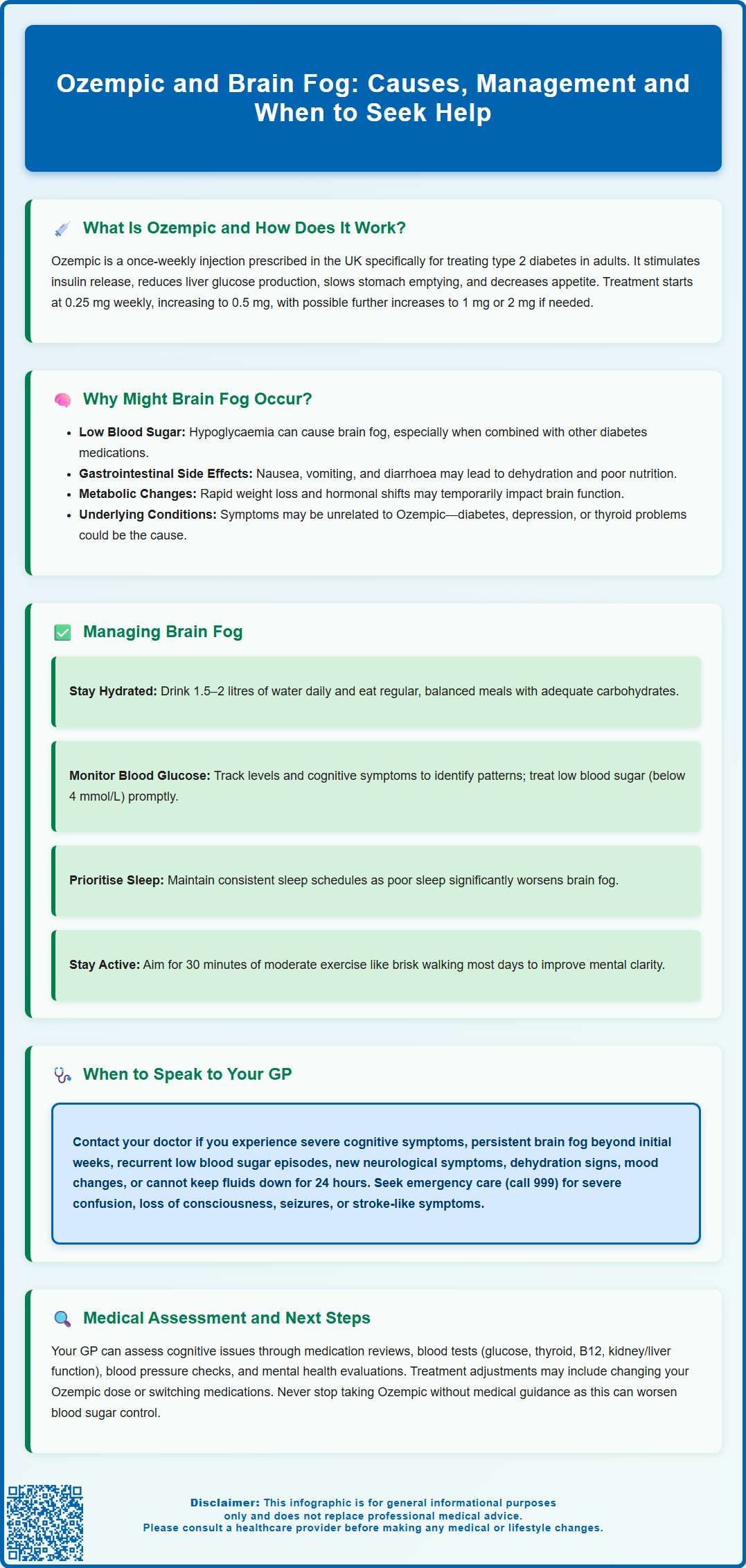Some individuals taking Ozempic (semaglutide) for type 2 diabetes report experiencing brain fog—cognitive symptoms such as difficulty concentrating, memory problems, and mental fatigue. Whilst brain fog is not listed as an official adverse reaction in UK product information, understanding potential contributing factors is important for patients and healthcare professionals. This article explores the possible mechanisms behind cognitive symptoms during Ozempic treatment, practical management strategies, and when to seek medical advice. If you experience persistent or concerning cognitive changes whilst taking Ozempic, consult your GP or diabetes care team for a thorough assessment.
Summary: Brain fog is not an officially recognised side effect of Ozempic, but some patients report cognitive symptoms that may relate to hypoglycaemia, gastrointestinal effects, dehydration, or metabolic changes during treatment.
- Ozempic (semaglutide) is a GLP-1 receptor agonist licensed in the UK for type 2 diabetes management, administered as a once-weekly subcutaneous injection.
- Potential mechanisms for cognitive symptoms include hypoglycaemia (especially with insulin or sulphonylureas), dehydration from gastrointestinal side effects, and rapid metabolic changes.
- Management strategies include maintaining adequate hydration and nutrition, monitoring blood glucose levels, prioritising sleep, and managing gastrointestinal symptoms.
- Contact your GP if cognitive symptoms are severe, persistent beyond initial weeks, accompanied by hypoglycaemia, or interfere with daily activities and safety.
- Never stop Ozempic without medical advice; your healthcare team can assess symptoms, adjust treatment, or investigate alternative causes of brain fog.
Table of Contents
What Is Ozempic and How Does It Work?
Ozempic (semaglutide) is a prescription medicine licensed in the UK for the treatment of type 2 diabetes mellitus in adults. It belongs to a class of medications known as glucagon-like peptide-1 (GLP-1) receptor agonists. Ozempic is administered as a once-weekly subcutaneous injection and works by mimicking the action of the naturally occurring hormone GLP-1, which plays a crucial role in regulating blood glucose levels.
The mechanism of action of Ozempic involves several key processes:
-
Stimulating insulin secretion from pancreatic beta cells in a glucose-dependent manner, meaning insulin is released only when blood sugar levels are elevated
-
Suppressing glucagon release, which reduces glucose production by the liver
-
Slowing gastric emptying, which helps moderate the rise in blood glucose after meals
-
Reducing appetite through effects on brain centres that regulate hunger and satiety
These combined actions help improve glycaemic control in people with type 2 diabetes. Treatment with Ozempic typically starts at 0.25 mg once weekly for 4 weeks (as an initiation dose to improve gastrointestinal tolerability), then increases to 0.5 mg once weekly. If additional glycaemic control is needed, the dose may be increased to 1 mg once weekly and subsequently to 2 mg once weekly if required.
Whilst Ozempic has gained attention for its weight loss effects, it is important to note that in the UK, it is specifically licensed for diabetes management and cardiovascular risk reduction in patients with type 2 diabetes and established cardiovascular disease. A related formulation, Wegovy (also semaglutide but at higher doses), is separately licensed for weight management. The National Institute for Health and Care Excellence (NICE) provides guidance on the appropriate use of GLP-1 receptor agonists within NHS diabetes care pathways.

Why Might Brain Fog Occur During Ozempic Treatment?
Brain fog is a colloquial term describing a constellation of cognitive symptoms including difficulty concentrating, memory problems, mental fatigue, and reduced mental clarity. Whilst brain fog is not listed as an adverse reaction in the official Ozempic Summary of Product Characteristics (SmPC), some patients report experiencing cognitive changes during treatment. There is no officially established causal link between Ozempic and brain fog, but several mechanisms may potentially contribute to these symptoms.
Hypoglycaemia (low blood sugar) represents one plausible explanation, particularly in patients taking Ozempic alongside other glucose-lowering medications such as sulphonylureas or insulin. Even mild hypoglycaemia can impair cognitive function, causing confusion, difficulty thinking clearly, and reduced concentration. When starting or increasing the dose of Ozempic, doses of insulin or sulphonylureas may need adjustment to reduce the risk of hypoglycaemia. However, Ozempic alone carries a relatively low risk of hypoglycaemia due to its glucose-dependent mechanism of action.
Rapid metabolic changes associated with significant weight loss and altered eating patterns may theoretically affect cognitive function temporarily, although this connection is not well-established in research. The body undergoes substantial physiological adjustments during weight reduction, including changes in hormone levels, electrolyte balance, and energy metabolism. Some individuals may experience a transitional period of cognitive symptoms as their body adapts.
Gastrointestinal side effects are among the most common adverse reactions to Ozempic, including nausea, vomiting, diarrhoea, and reduced appetite. These symptoms can lead to:
-
Dehydration and electrolyte imbalances affecting brain function
-
Inadequate caloric or nutritional intake, potentially causing fatigue and poor concentration
-
Sleep disruption due to gastrointestinal discomfort
-
General malaise that indirectly impacts cognitive performance
It is also important to consider that cognitive symptoms may be unrelated to Ozempic itself. Type 2 diabetes, depression, anxiety, sleep disorders, thyroid dysfunction, and numerous other medical conditions can all cause brain fog independently.
Managing Brain Fog While Taking Ozempic
If you experience cognitive symptoms whilst taking Ozempic, several practical strategies may help improve mental clarity and overall wellbeing. These approaches focus on optimising your general health and minimising potential contributing factors.
Maintain adequate hydration and nutrition:
-
Aim for at least 1.5–2 litres of water daily, adjusting for activity level and climate (follow your healthcare professional's advice if you have been told to restrict fluids due to heart, kidney or liver disease)
-
Ensure regular, balanced meals even if appetite is reduced
-
Focus on nutrient-dense foods including lean proteins, whole grains, fruits, vegetables, and healthy fats
-
Consider smaller, more frequent meals if nausea limits food intake
-
Avoid excessive restriction of carbohydrates, as the brain requires glucose for optimal function
Monitor blood glucose levels if you have been advised to do so by your healthcare team. Keep a record of any cognitive symptoms alongside your glucose readings to identify potential patterns. If you notice symptoms coinciding with low blood sugar readings (typically below 4 mmol/L), discuss this with your GP or diabetes specialist nurse. Remember the guidance '4 is the floor' – if your blood glucose is below 4 mmol/L, you should treat the hypoglycaemia promptly.
Prioritise sleep hygiene by maintaining consistent sleep and wake times, creating a comfortable sleep environment, and addressing any factors that may disrupt rest. Poor sleep quality significantly impairs cognitive function and may exacerbate brain fog.
Manage gastrointestinal side effects by eating slowly, avoiding large or fatty meals, and staying upright after eating. If nausea is problematic, your GP may recommend anti-emetic medication or adjusting your Ozempic dose. Do not adjust your dose without medical advice.
Engage in regular physical activity, which supports both metabolic health and cognitive function. Even moderate exercise such as brisk walking for 30 minutes most days can improve mental clarity, mood, and overall wellbeing.
Allow time for adjustment. Many side effects of Ozempic, including potential cognitive symptoms, may improve as your body adapts to the medication over several weeks. However, persistent or worsening symptoms warrant medical review.
Consider safety implications. Avoid driving or operating machinery if you experience significant confusion, drowsiness, or are at risk of hypoglycaemia.
When to Speak to Your GP About Cognitive Symptoms
Whilst mild, transient cognitive changes may occur during the initial adjustment period with Ozempic, certain situations require prompt medical attention. Contact your GP or diabetes care team if you experience:
-
Severe or worsening cognitive symptoms that interfere with daily activities, work, or safety
-
Symptoms of hypoglycaemia including confusion, shakiness, sweating, rapid heartbeat, or difficulty speaking—particularly if recurrent
-
Persistent brain fog lasting beyond the first few weeks of treatment or following a dose increase
-
New neurological symptoms such as severe headaches, visual changes, weakness, numbness, or difficulty with speech or coordination
-
Signs of dehydration including dark urine, dizziness, dry mouth, or reduced urination
-
Mood changes including depression, anxiety, or unusual thoughts
-
Inability to keep fluids down for 24 hours or severe, persistent vomiting
Seek urgent medical attention (call 999 or attend A&E) if you experience severe confusion, loss of consciousness, seizures, or any symptoms suggesting a stroke or other acute neurological event. For urgent but non-emergency concerns, contact NHS 111 for advice.
Your GP can conduct a thorough assessment to determine whether cognitive symptoms are related to Ozempic or another underlying cause. This evaluation may include:
-
Review of all current medications and potential drug interactions
-
Blood tests to assess glucose control (HbA1c), thyroid function, vitamin B12 levels, kidney and liver function, and electrolytes
-
Blood pressure measurement
-
Assessment for depression, anxiety, or sleep disorders
-
Consideration of alternative causes of cognitive impairment
Depending on findings, your doctor may recommend adjusting your Ozempic dose, switching to an alternative diabetes medication, or addressing other contributing factors. Never stop taking Ozempic without medical advice, as abrupt discontinuation may lead to deterioration in blood glucose control. NICE guidance emphasises individualised diabetes management, and your healthcare team can work with you to find the most appropriate treatment approach that balances glycaemic control with tolerability and quality of life.
If you suspect you are experiencing side effects from Ozempic, you can report these through the MHRA Yellow Card Scheme (yellowcard.mhra.gov.uk or via the Yellow Card app).
Frequently Asked Questions
Is brain fog a recognised side effect of Ozempic?
Brain fog is not listed as an adverse reaction in the official Ozempic Summary of Product Characteristics, and there is no established causal link. However, some patients report cognitive symptoms that may relate to factors such as hypoglycaemia, gastrointestinal side effects, dehydration, or metabolic changes during treatment.
What should I do if I experience brain fog whilst taking Ozempic?
Maintain adequate hydration and nutrition, monitor blood glucose levels if advised, prioritise sleep, and manage any gastrointestinal symptoms. If cognitive symptoms are severe, persistent, or interfere with daily activities, contact your GP or diabetes care team for assessment. Never stop Ozempic without medical advice.
When should I seek urgent medical attention for cognitive symptoms on Ozempic?
Seek urgent medical attention by calling 999 or attending A&E if you experience severe confusion, loss of consciousness, seizures, or symptoms suggesting a stroke or acute neurological event. For recurrent hypoglycaemia, persistent severe symptoms, or new neurological signs, contact your GP or diabetes care team promptly.
The health-related content published on this site is based on credible scientific sources and is periodically reviewed to ensure accuracy and relevance. Although we aim to reflect the most current medical knowledge, the material is meant for general education and awareness only.
The information on this site is not a substitute for professional medical advice. For any health concerns, please speak with a qualified medical professional. By using this information, you acknowledge responsibility for any decisions made and understand we are not liable for any consequences that may result.
Heading 1
Heading 2
Heading 3
Heading 4
Heading 5
Heading 6
Lorem ipsum dolor sit amet, consectetur adipiscing elit, sed do eiusmod tempor incididunt ut labore et dolore magna aliqua. Ut enim ad minim veniam, quis nostrud exercitation ullamco laboris nisi ut aliquip ex ea commodo consequat. Duis aute irure dolor in reprehenderit in voluptate velit esse cillum dolore eu fugiat nulla pariatur.
Block quote
Ordered list
- Item 1
- Item 2
- Item 3
Unordered list
- Item A
- Item B
- Item C
Bold text
Emphasis
Superscript
Subscript












